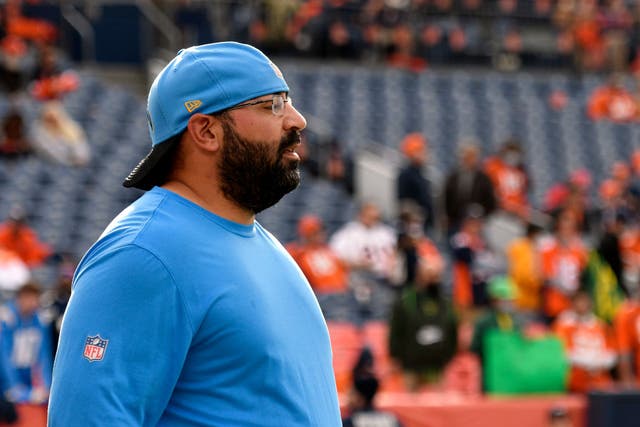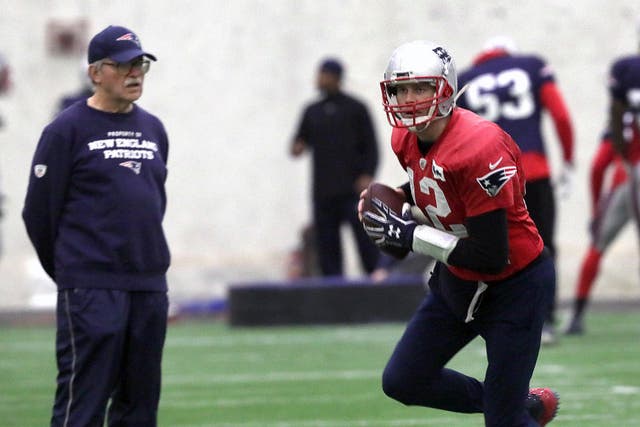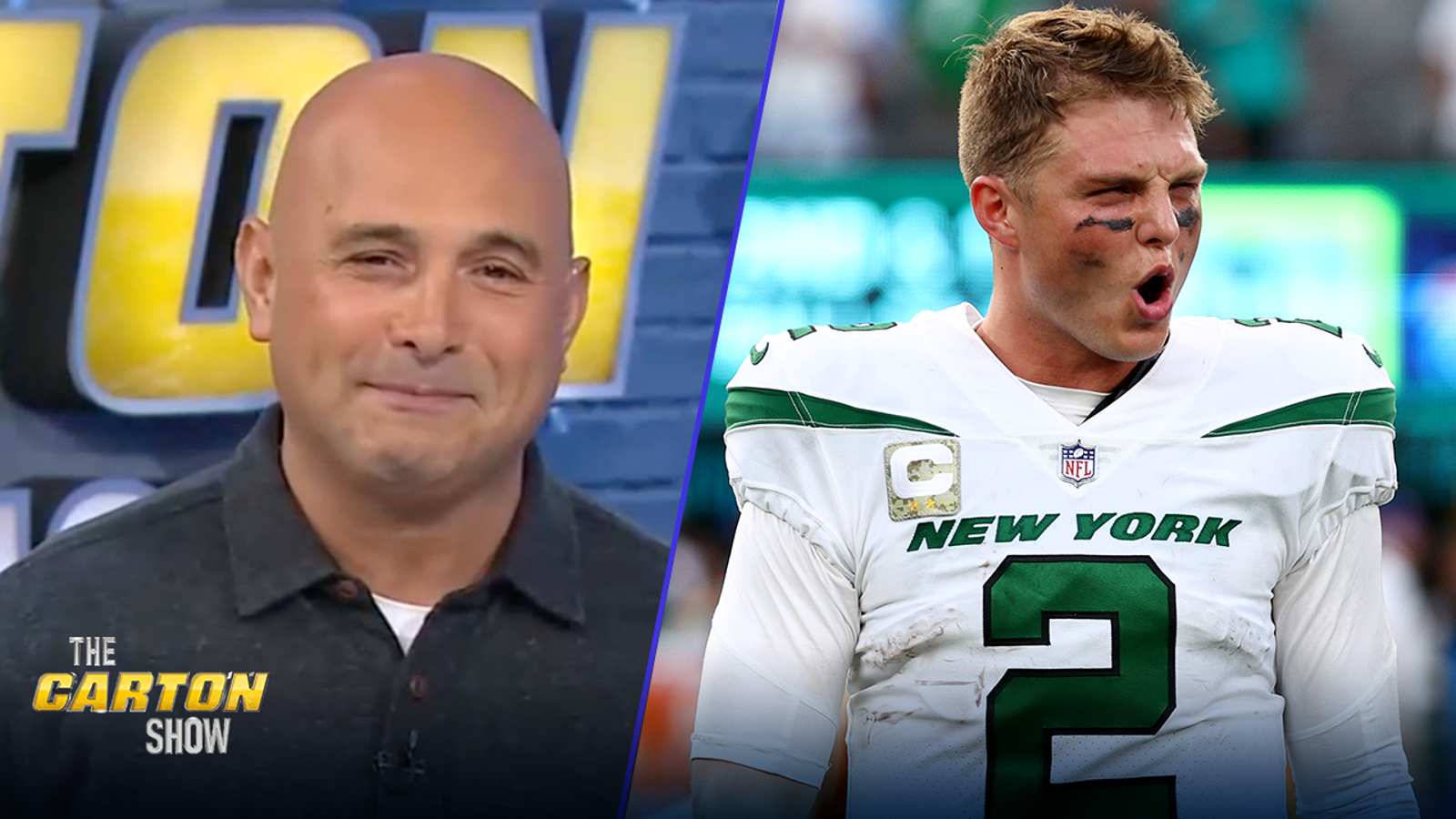
Who is Dan Shamash and how did he become the Jets’ secret weapon?
Dan Shamash is constantly living in the future. He spends every hour of his work week — and that sometimes means every waking hour of a day — trying to anticipate, prepare and predict the information that the New York Jets and head coach Robert Saleh will need for the upcoming game.
Shamash — or "Smash" to those who adore him, which seems to be everyone in the Jets organization — works as the team's Situational Football and Game Management Coordinator.
Never heard of that job? That's because he's the only person in the NFL with that title. Maybe ever.
Three other people in the league have "Game Management" attached to their job titles. Shamash seems to be the only person who has the freedom to really focus on the role as his highest priority.
"Between me and Robert, we were able to carve out this role where I can fill a need where [other] guys just typically run out of time," Shamash told me.
So what does it mean? What does he do with his time? Well, there's a lot to it.
But before we dive into what might sound sort of like a strange blend of voodoo, nerdy analytics and chaos magic, I want to show the results. The Jets are one of the most surprising teams in the NFL (for their success) alongside the Denver Broncos (for their lack thereof). The Jets are 4-1 in one-possession games this year. The Broncos are 3-4 in those situations.
"Old ‘Smash-Ball,' he talks about it every Friday: ‘Games are lost, not won in this league,'" Saleh said. "So, how do you avoid being the team that loses football games?"
Last year, the Jets were outscored by 39 points in two-minute situations before halftime and at the end of the fourth quarter, per TruMedia and The Athletic. In the wake of that season, New York hired Shamash to turn things around. This year, the Jets have so far outscored opponents by 44 points in those same situations — including being plus-10 points in those situations against the Buffalo Bills in Week 9.
Jets' upset win over Bills has Craig eating his words
It's no coincidence that the Broncos made an in-season hire to add someone to help rookie head coach Nathaniel Hackett with game management. It's no coincidence that Saleh seems to credit Shamash at every opportunity. New York looks different this year for a number of reasons. One of those reasons is Smash.
So let's dive into what, exactly, he does.
Game Management Coordinator
Shamash sits in the booth during games and communicates over the headset with Saleh, offensive coordinator Mike LaFleur, defensive coordinator Jeff Ulbrich and special teams coordinator Brant Boyer.
Shamash helps with "decision science." The stakes are ridiculously high — for Saleh.
After all, the head coach is the one who meets with the media after the game. Saleh is the one whose job is at stake when mistakes are made with game management. But it's Shamash who helps Saleh sort out these tough in-game situations: Should the Jets challenge a play? Should the Jets go on fourth down? Should the Jets kick a field goal? Should the Jets try an onside kick? Should the Jets score? Should the Jets let their opponents score? Should the Jets run the clock? Should the Jets hurry up?
Every decision funnels through the coaching side. At the exact same time, every decision funnels through the analytics side. Shamash lives in between those two worlds. Smash laughed at my suggestion that he lives on the front line of the culture war between the nerds and the meatheads. But he suggested that he does consider both perspectives when he helps Saleh make decisions.
"That's probably both football and analytical based — not really necessarily pushing one to the other. Kind of a mesh between the two," Shamash said.
Through his unique experiences in the NFL, Shamash can help Saleh excel on fourth downs and with the management of timeouts and challenges — among so many other elements of the game.
For the 14 years that he worked in the NFL prior to this gig, the 36-year-old Shamash was either an offensive assistant or a quality control coach. Those are titles that entry-level employees hold — and usually not for long. Most people with those titles move into roles as positional coaches and coordinators. But not Shamash, who has hung around in the league with titles that didn't match his responsibilities or seniority.
"There's no ego with him," said Gus Bradley, the Colts defensive coordinator. Bradley served in the same role for the Jaguars when Saleh and Shamash were on staff in Jacksonville. "Whatever his role is, he'll do it to the highest level. Whatever you ask of him, he takes great pride in his work. So there'd be times you know, here he is at 12:30 in the morning, and he's talking to Dean Blandino."
We'll come back to those midnight conversations with Blandino, now an officiating analyst for FOX Sports and formerly the NFL's vice president of officiating, because they actually pertain to the second half of Shamash's gig.

Shamash has spent 14 seasons in the NFL, but the league is only now starting to take true advantage of his skill-set. (Photo courtesy of the New York Jets)
But the point remains, his ascent up the NFL pecking order is an oddity. He has done so many things, often completing those tasks thanklessly. In 2008 with the Jets and 2009 with the Browns, Shamash worked under then-head coach Eric Mangini. And Mangini admitted Shamash didn't stand out, in part because people at that level simply did their jobs without praise. It was only when they made mistakes that they would stand out — and for the wrong reasons, of course.
Shamash didn't begin to focus intently on game management as a key part of his job until 2012 — though decision science had interested him ever since he was an undergrad at Carnegie Mellon working on a dual-focus degree in philosophy and statistics. At first, Shamash chuckled and said that fact didn't relate to the story. But, of course, it seems to have everything to do with his current job.
"I went in as a philosophy major," Shamash said. "It kind of got a little too logic-based for me, kind of branched out toward the statistics side. That eventually got a little too data-based for me and I kind of found a sweet spot with decision science while still having a heavy influence on philosophy and statistics overall."
That kind of acuity for decision-making appealed to former Buccaneers coach Greg Schiano, who in 2012 promoted Shamash into a situational role to see what he could do for the team. At the time, however, Shamash was much younger than other people performing the role. There was substantially less access to data in the NFL. That's why, as Shamash told The Athletic, he ended up watching every game in the league on Mondays — no matter how much sleep he lost in the process.
The man likes collecting data. And that didn't just mean absorbing numbers. That meant absorbing football. Ten years later, he is sharing what he has learned — and what he's actively learning — in real time with Saleh.
Now, to be clear, Saleh has the final say. And Saleh doesn't always take Shamash's often-aggressive advice. But if you look at how the Jets managed their fourth quarter in the win over the Steelers, how they made a huge comeback to beat the Browns (overcoming a 13-point deficit in the final two minutes, which no NFL team had done in 21 years) and how they scored the go-ahead touchdown against the Bills (bleeding 6:46 off the clock and forcing Buffalo to burn all three of its timeouts), you will see the Jets playing Smash Ball.
The comeback over the Browns is particularly impressive, with the Jets having a 99.9% chance of losing the game with 1:55 left on the clock. Cleveland does not have an in-game coordinator for situations. Instead, the team prepares the information and predetermines its decisions. The Browns lost it — so that the Jets could win it. The game turned around the season for the 0-1 Jets.
"I give Robert a lot of credit, not only for hiring Dan," Mangini said, "but for listening and then also giving Dan credit. [It's] very easy if you have a big ego to say, ‘That was me.'"
Instead, Saleh has repeatedly said: That was Smash.
Situational Football Coordinator and "Smash Ball"
During the week, Shamash works with New York's analytics department and helps coach the tight ends during practice — while bouncing between other positions. And on Fridays, he leads something called Smash Ball. This presentation is how he has won a fan base among the players.
"His energy is f------ crazy," running back Michael Carter told me. "And you can say crazy because it is f------ crazy."
Shamash has been organizing a weekly presentation on the NFL rules for years. He started doing it when he worked under Anthony Lynn for the Chargers.

Shamash worked for the Chargers from 2017 to 2021, during which time he started his weekly "Smash Ball" presentations. (Photo by Michael Allio/Icon Sportswire via Getty Images)
Every Friday, he steps in front of the entire team to relay a coaching point on situational football. Maybe it's an officiating trend that's new in 2022. Maybe Shamash anticipates an oncoming trend — like the influx of roughing the passer penalties that followed Tua Tagovailoa's terrifying concussion. Maybe it's about clock management — and when the clock does and doesn't stop at the end of the second and fourth quarters.
"He'll show you different situations are the same situation," Carter said. "Like, it's so much. I'm like, ‘Damn I need a notebook.'"
Shamash's tips also help players take calculated risks.
"The biggest thing is knowing when to take our shots and when to let off a little bit," linebacker Quincy Williams told me.
You often hear the expression: "Situational awareness." This is what it means. This is what Shamash spends his week teaching the players.
"Just like they learn Cover-3, or they learn a certain route combination or whatever it is, this situational football is such a huge component of it. And the rules are such a huge component of it if you want to be good," Mangini said.
Every session requires similar preparation to a game, Shamash explained. He is constantly on the phone with rules experts like Blandino, who said he is in touch with Shamash four or five times per week. Shamash is in regular communication with the league office, too.
"The rule book is like an encyclopedia, and you've got to know it in and out," Blandino said. "I think that's what makes a football staff [and] a coaching staff need someone like Smash — because the head coach can't do it. The head coach has a million other things going on. And you need somebody that's going to dive in."
Because the rule book is dense and frankly boring, Shamash brings the energy to his sessions to animate his players. They get excited about the sessions, literally chanting his name to cheer him onto the stage. Smash does pop quizzes. He will teach a situation and then, at the end, he will show players a new situation and give them the opportunity to make the call — not unlike the old "You Make the Call" segment on TV.
The Jets players are just starting to learn how to make the rules work for them – rather than against them. Every session will help their chances in high-stakes games.
"Sometimes you teach a situation, and you may teach it in training camp, or you may teach it early in the season, and it doesn't show up," Mangini said. "But suddenly, you're in a game that decides whether or not you win the division or a playoff game or the Super Bowl, and one of those situations that you covered somewhere along the line comes up. Then the value is exponentially higher. And it's not, ‘What do we do?' It's: ‘Oh yeah, remember, we covered this?'"
How Smash might begin changing the NFL
Shamash isn't the first person to perform these duties, even if he's the first person with this job title.
In a way, former Patriots Director of Football Research Ernie Adams was the first person to truly take on this role. For years, Adams' role with New England remained something of a mystery. But in recent years, his responsibilities have come to light, particularly following his retirement after the 2020 season. And those duties included — but were not limited to — game management and situational coordination.
Blandino has a strong relationship with Shamash, but his relationship with Adams and Bill Belichick predates it.
"Ernie Adams is almost like the godfather of this role," Blandino said. "I had a lot of conversations with Bill and Ernie, and they were probably one of the first teams to really go that deep in terms of the officiating and the rules. Ernie was kind of like all a part of that and situations and fourth downs, and now you just see every team has someone in that role.
"When Ernie first started doing it with the Patriots, he was probably the only one."

With the Patriots, Ernie Adams started the game management and situational football role that Shamash now fills for the Jets. (Photo by Barry Chin/The Boston Globe via Getty Images)
It's premature to peg Shamash the next Ernie Adams. But if Shamash wants a north star for development, Adams might not be a bad role model.
"There's those accountants that can fill out your tax forms, and then those accountants that can push the limits of tax law within the range that tend to be more successful for their clients. And I think there's the same thing with rules and with situations," Mangini said.
The Patriots have, for years, pushed the rules. They've made new rules through offseason proposals — which allows them to dictate and have the rules work for them. For now, Shamash is reacting to the rules and the micro-adjustments during the course of the season. In the future? He could start proposing rules that benefit New York, just like Adams did for years in New England.
And then there's the matter of exploiting loopholes. The Patriots have been historically as good as any team at finding gaps in the rule book, like when they have used trick formations — tinkering with the eligibility rules for receivers — to stage a major comeback against the Ravens in the 2014 playoffs. It led to a Super Bowl win for New England over the Seattle Seahawks. Again, that kind of rule-based work could be fair game for Shamash to seek out.
The other ways that Shamash may change the NFL is the normalization of people taking on his role. It's a copycat league, after all. We could see more Situational Coordinators in the coming years.
"Should it be normalized? It should absolutely be normalized," Mangini said. "But there's not a lot of people who have been doing this for years. So he's got experience in it. He's thought in those terms. He's built up a database … of specific situations that he studied year in and year out, that he's added to sort of his book.
"So you can add that position, but it's not that easy to find someone to fill that position. And then … Can they do it in the moment? And that is a gigantic [uncertainty]. Yes, I've had people who had years and years of [experience] officiating in the booth to try to help me with challenges. And in the moment, they weren't very good. It's a lot different presenting it in the classroom in a controlled environment with time from being there in the moment and having to make a call."
Shamash has quickly proven he's good at what he does. And Saleh has proven he's an extremely humble and shrewd coach to have added Shamash – and readily incorporated the coordinator's ideas into the Jets' preparation and on game day.
Shamash has been a smashing success in New York. And it could change the way the entire league thinks about situational football.
Prior to joining FOX Sports as the AFC East reporter, Henry McKenna spent seven years covering the Patriots for USA TODAY Sports Media Group and Boston Globe Media. Follow him on Twitter at @McKennAnalysis.











